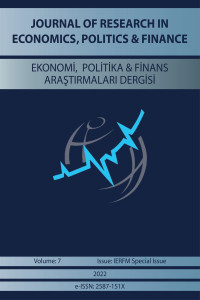Öz
Anahtar Kelimeler
Eksik Bilgi Koordinasyon Ortak Bilgi Karşılıklı Bilgi Finansal Krizler.
Teşekkür
Yazar IERFM2022 kongresindeki sunumuna katılarak geribildirim veren herkese teşekkürlerini sunar.
Kaynakça
- Abreu, D. and Brunnermeier, M.K. (2003). Bubbles and crashes. Econometrica, 71(1), 173-204. https://www.doi.org/10.1111/1468-0262.00393
- Aumann, R.J. (1976). Agreeing to disagree. The Annals of Statistics, 4(6), 1236-1239. Retrieved from https://www.jstor.org/
- Carlsson, H. and van Damme, E. (1993). Global games and equilibrium selection. Econometrica, 61(5), 989-1018. https://www.doi.org/10.2307/2951491
- Dalkıran, N.A. (2012). Issues of robustness in economics of information (Doctoral dissertation). Northwestern University, Evanston, IL, USA.
- Dalkıran, N.A. and Hoffman, M. (2011). Common knowledge and equilibria switching. Issues of robustness in economics of information. Northwestern University ProQuest Dissertations Publishing, 2012. 3508509. Ann Arbor MI, USA.
- Dalkiran, N.A., Hoffman M., Paturi R., Ricketts D. and Vattani A. (2012). Common knowledge and state-dependent equilibria. In M. Serna (Ed.), Algoritmic game theory (pp. 84-95). Papers presented at the International Symposium on Algorithmic Game Theory. Barcelona, Spain. Berlin: Springer. https://www.doi.org/10.1007/978-3-642-33996-7_8
- Diamond, D.W. and Dybvig, P.H. (1983). Bank runs, deposit insurance, and liquidity. Journal of Political Economy, 91(3), 401-419. https://www.doi.org/10.1086/261155
- Fagin, R., Halpern, J.Y., Moses, Y. and Vardi, M. (1995). Reasoning about knowledge. Boston: MIT Press.
- Friedell, M.F. (1969). On the structure of shared awareness. Behavioral Science, 14(1), 28-39. https://www.doi.org/10.1002/bs.3830140105
- Geanakoplos, J. (1994). Common knowledge. In R. Aumann and S. Hart (Eds.), Handbook of game theory with economic applications, Volume: 2 (pp. 1437-1496). Amsterdam: Elsevier Science B.V. https://www.doi.org/10.1016/S1574-0005(05)80072-4
- Hintikka, K.J.J. (1962). Knowledge and belief: An introduction to the logic of the two notions. New York: Cornell University Press.
- Lewis, D. (1969). Convention: A philosophical study. Boston: Harvard University Press.
- Littlewood, J.E. (1953). A mathematician's miscellany. Cambridge: Cambridge University Press.
- Morris, S. and Shin, H.S. (1997). Approximate common knowledge and coordination: Recent lessons from game theory. Journal of Logic, Language and Information, 6, 171-190. https://www.doi.org/10.1023/A:1008270519000
- Morris, S. and Shin, H.S. (1998). Unique equilibrium in a model of self-fulfilling currency attacks. American Economic Review, 88(3), 587-597. Retrieved from https://www.jstor.org/
- Morris, S. and Shin, H.S. (2003). Global games: Theory and applications. In M. Dewatripont, L. Hansen and S. Turnovsky (Eds.), Advances in economics and econometrics (pp. 56-114). Paper presented at the Eight World Congress of the Econometric Society. Cambridge: Cambridge University Press.
- Osborne, M.J. and Rubinstein, A. (1994). A course in game theory. Boston: MIT Press.
- Reinhart, C.M. and Rogoff, K.S. (2009). This time is different. Princeton: Princeton University Press. https://www.doi.org/10.1515/9781400831722
- Rubinstein, A. (1989). The electronic mail game: Strategic behavior under “almost common knowledge”. American Economic Review, 79(3), 385-391. Retrieved from https://www.jstor.org/
Öz
Anahtar Kelimeler
Incomplete Information Common Knowledge Mutual Knowledge Financial Crises.
Kaynakça
- Abreu, D. and Brunnermeier, M.K. (2003). Bubbles and crashes. Econometrica, 71(1), 173-204. https://www.doi.org/10.1111/1468-0262.00393
- Aumann, R.J. (1976). Agreeing to disagree. The Annals of Statistics, 4(6), 1236-1239. Retrieved from https://www.jstor.org/
- Carlsson, H. and van Damme, E. (1993). Global games and equilibrium selection. Econometrica, 61(5), 989-1018. https://www.doi.org/10.2307/2951491
- Dalkıran, N.A. (2012). Issues of robustness in economics of information (Doctoral dissertation). Northwestern University, Evanston, IL, USA.
- Dalkıran, N.A. and Hoffman, M. (2011). Common knowledge and equilibria switching. Issues of robustness in economics of information. Northwestern University ProQuest Dissertations Publishing, 2012. 3508509. Ann Arbor MI, USA.
- Dalkiran, N.A., Hoffman M., Paturi R., Ricketts D. and Vattani A. (2012). Common knowledge and state-dependent equilibria. In M. Serna (Ed.), Algoritmic game theory (pp. 84-95). Papers presented at the International Symposium on Algorithmic Game Theory. Barcelona, Spain. Berlin: Springer. https://www.doi.org/10.1007/978-3-642-33996-7_8
- Diamond, D.W. and Dybvig, P.H. (1983). Bank runs, deposit insurance, and liquidity. Journal of Political Economy, 91(3), 401-419. https://www.doi.org/10.1086/261155
- Fagin, R., Halpern, J.Y., Moses, Y. and Vardi, M. (1995). Reasoning about knowledge. Boston: MIT Press.
- Friedell, M.F. (1969). On the structure of shared awareness. Behavioral Science, 14(1), 28-39. https://www.doi.org/10.1002/bs.3830140105
- Geanakoplos, J. (1994). Common knowledge. In R. Aumann and S. Hart (Eds.), Handbook of game theory with economic applications, Volume: 2 (pp. 1437-1496). Amsterdam: Elsevier Science B.V. https://www.doi.org/10.1016/S1574-0005(05)80072-4
- Hintikka, K.J.J. (1962). Knowledge and belief: An introduction to the logic of the two notions. New York: Cornell University Press.
- Lewis, D. (1969). Convention: A philosophical study. Boston: Harvard University Press.
- Littlewood, J.E. (1953). A mathematician's miscellany. Cambridge: Cambridge University Press.
- Morris, S. and Shin, H.S. (1997). Approximate common knowledge and coordination: Recent lessons from game theory. Journal of Logic, Language and Information, 6, 171-190. https://www.doi.org/10.1023/A:1008270519000
- Morris, S. and Shin, H.S. (1998). Unique equilibrium in a model of self-fulfilling currency attacks. American Economic Review, 88(3), 587-597. Retrieved from https://www.jstor.org/
- Morris, S. and Shin, H.S. (2003). Global games: Theory and applications. In M. Dewatripont, L. Hansen and S. Turnovsky (Eds.), Advances in economics and econometrics (pp. 56-114). Paper presented at the Eight World Congress of the Econometric Society. Cambridge: Cambridge University Press.
- Osborne, M.J. and Rubinstein, A. (1994). A course in game theory. Boston: MIT Press.
- Reinhart, C.M. and Rogoff, K.S. (2009). This time is different. Princeton: Princeton University Press. https://www.doi.org/10.1515/9781400831722
- Rubinstein, A. (1989). The electronic mail game: Strategic behavior under “almost common knowledge”. American Economic Review, 79(3), 385-391. Retrieved from https://www.jstor.org/
Ayrıntılar
| Birincil Dil | Türkçe |
|---|---|
| Konular | Ekonomi |
| Bölüm | Makaleler |
| Yazarlar | |
| Yayımlanma Tarihi | 24 Ekim 2022 |
| Kabul Tarihi | 17 Ekim 2022 |
| Yayımlandığı Sayı | Yıl 2022 Cilt: 7 Sayı: Özel Sayı |


